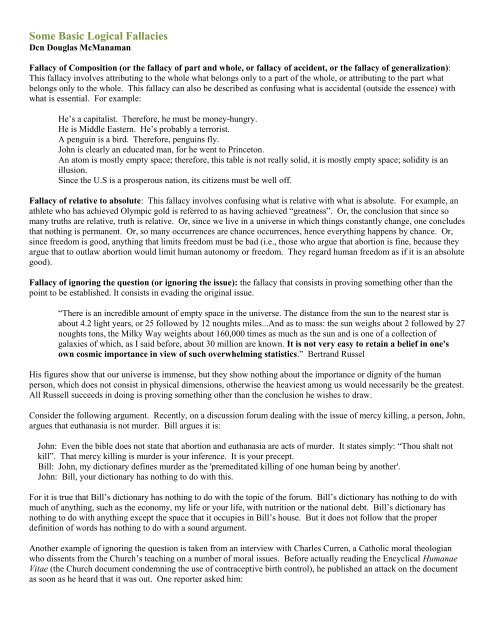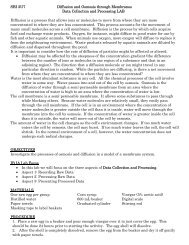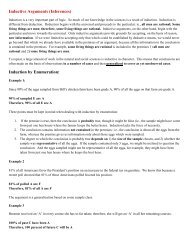Some Basic Logical Fallacies
Some Basic Logical Fallacies
Some Basic Logical Fallacies
You also want an ePaper? Increase the reach of your titles
YUMPU automatically turns print PDFs into web optimized ePapers that Google loves.
<strong>Some</strong> <strong>Basic</strong> <strong>Logical</strong> <strong>Fallacies</strong>Dcn Douglas McManamanFallacy of Composition (or the fallacy of part and whole, or fallacy of accident, or the fallacy of generalization):This fallacy involves attributing to the whole what belongs only to a part of the whole, or attributing to the part whatbelongs only to the whole. This fallacy can also be described as confusing what is accidental (outside the essence) withwhat is essential. For example:He’s a capitalist. Therefore, he must be money-hungry.He is Middle Eastern. He’s probably a terrorist.A penguin is a bird. Therefore, penguins fly.John is clearly an educated man, for he went to Princeton.An atom is mostly empty space; therefore, this table is not really solid, it is mostly empty space; solidity is anillusion.Since the U.S is a prosperous nation, its citizens must be well off.Fallacy of relative to absolute: This fallacy involves confusing what is relative with what is absolute. For example, anathlete who has achieved Olympic gold is referred to as having achieved “greatness”. Or, the conclusion that since somany truths are relative, truth is relative. Or, since we live in a universe in which things constantly change, one concludesthat nothing is permanent. Or, so many occurrences are chance occurrences, hence everything happens by chance. Or,since freedom is good, anything that limits freedom must be bad (i.e., those who argue that abortion is fine, because theyargue that to outlaw abortion would limit human autonomy or freedom. They regard human freedom as if it is an absolutegood).Fallacy of ignoring the question (or ignoring the issue): the fallacy that consists in proving something other than thepoint to be established. It consists in evading the original issue.“There is an incredible amount of empty space in the universe. The distance from the sun to the nearest star isabout 4.2 light years, or 25 followed by 12 noughts miles...And as to mass: the sun weighs about 2 followed by 27noughts tons, the Milky Way weights about 160,000 times as much as the sun and is one of a collection ofgalaxies of which, as I said before, about 30 million are known. It is not very easy to retain a belief in one'sown cosmic importance in view of such overwhelming statistics.” Bertrand RusselHis figures show that our universe is immense, but they show nothing about the importance or dignity of the humanperson, which does not consist in physical dimensions, otherwise the heaviest among us would necessarily be the greatest.All Russell succeeds in doing is proving something other than the conclusion he wishes to draw.Consider the following argument. Recently, on a discussion forum dealing with the issue of mercy killing, a person, John,argues that euthanasia is not murder. Bill argues it is:John: Even the bible does not state that abortion and euthanasia are acts of murder. It states simply: “Thou shalt notkill”. That mercy killing is murder is your inference. It is your precept.Bill: John, my dictionary defines murder as the 'premeditated killing of one human being by another'.John: Bill, your dictionary has nothing to do with this.For it is true that Bill’s dictionary has nothing to do with the topic of the forum. Bill’s dictionary has nothing to do withmuch of anything, such as the economy, my life or your life, with nutrition or the national debt. Bill’s dictionary hasnothing to do with anything except the space that it occupies in Bill’s house. But it does not follow that the properdefinition of words has nothing to do with a sound argument.Another example of ignoring the question is taken from an interview with Charles Curren, a Catholic moral theologianwho dissents from the Church’s teaching on a number of moral issues. Before actually reading the Encyclical HumanaeVitae (the Church document condemning the use of contraceptive birth control), he published an attack on the documentas soon as he heard that it was out. One reporter asked him:
"Shouldn’t you read the document first, before you come out publicly against it?" To which Curren replied: "There’sno virtue in delay”.Indeed, there is no virtue in delay. Virtue is a disposition, a good habit, and 'delay' is an unexpected lapse of time, orlateness. Virtue and delay have nothing to do with one another. But the question was: “Shouldn’t you read the documentfirst, before you come out publicly against it?”Or, consider Pierre Elliot Trudeau's classic statement that duped a generation of Canadians'There's no place for the state in the bedrooms of the nation'The issue is not whether there is a place for the state in the bedrooms of the nation, but whether the state should makelaws governing sexual behaviour which bears upon character, and which in turn plays a part in determining the characterof the state as a whole; for law makes a statement which instructs and shapes the character of the people who are underthat law. In order to bolster his position that people should be allowed to do what they want when it comes to sexualmatters, Trudeau asserts that there is no place for the state in the bedrooms of the nation, evoking images of police orpublic officials entering into a person's bedroom in order to take note of what is going on.Species of Ignoring the Question:Ad hominem (to the man): This involves the criticism of some person's position or belief by criticizing the person ratherthan the position itself. For instance,Einstein couldn't have been right about Relativity, for just look at the way he combs his hair.Father Damian couldn’t be a good and holy priest, for just look at his belly.He doesn’t know what he’s talking about. Just listen to his stuttering.I’m not going to vote for him; I can’t stand the way he looks.The Fallacy of Ridicule (bully tactics): This is a kind of ad hominem argument. One tries to discredit a person’sargument by ridiculing him. “That’s just ridiculous!” “Only a fool would think such a thing!” “Did you leave your brainat the door when you came here?” “Do you know how ridiculous you sound?”The Fallacy of the Double Standard: This is a fallacy that involves an inconsistent application of a principle orstandard, that is, applying it differently to two different persons, without any rational basis. Perhaps it is a latent adhominem argument. For example, the typical liberal will argue that former President Bill Clinton (a Democrat) cancommit perjury, adultery, and sexually abuse a woman young enough to be his daughter and lie about it under oath, andremain a good president because “his private life has nothing to do with his public life.” But when these same peoplediscover even the slightest moral flaw in the history of a Republican candidate, the latter is immediately be dismissed asunworthy of political office. Consider:“You can't possibly understand menopause because you are a man.”“Those rules don't apply to me since I am older than you.”Consider the following excerpt from Chris Horner’s The Politically Incorrect Guide to Global Warming: “People weretraveling more (vehicle-miles traveled were up by 140 percent), the U.S. Gross Domestic Product was up 147 percent, andU.S. population climbed 33 percent. Still, air pollution fell. For eight years, Clinton-Gore took credit for these gains—which had been under way for decades—while they simultaneously claimed tens of thousands of annual deaths from airpollution whenever such claims could justify greater regulatory controls. <strong>Some</strong>how, though, environmentalist groups andthe media woke up on the rainy day of President George W. Bush’s inauguration and found that there was no good news.Things were getting worse, every day, we were told, every day. This gloomy drumbeat for years doubtless laid thefoundation for what Gallup concluded in its 2005 annual “Earth Day” poll. That march, 63 percent of Americans polledsaid the environment was getting worse, even though the positive, long-running positive trends continued during the Bushadministration.” (Cf. Chapter 3: The Sky is Falling)
Ad verecundiam (Shame): (Latin: Verecundia: “shame”). This fallacy, otherwise known as the fallacy of misplacedauthority, consists of appealing to the testimony of an authority on an issue that is outside his or her proper field ofexpertise."My doctor assured me that Fords are the best cars. Therefore, I'm going to buy a Ford. After all, he is a doctor."Consulting Nobel Prize winners in Chemistry, Physics, and Medicine in order that they may shed light on world issuesand offer political solutions to the world's problems is also an instance of the fallacy of misplaced authority. Anothermode of this fallacy consists in appealing to an authority in order to shame an opponent in debate: “Who are you to argueagainst his point of view. He’s got a Ph.D. What do you have?”Ad Populum (The Fallacy of Appeal to the People): This fallacy occurs when a speaker attempts to get some group toagree to a particular position by appealing solely to their bigotry, biases, and prejudices or, in some cases, merely to theirdesire to hear what they already believe. As an example, consider the election when Canadian politicians appealed to thepeople's fears about medicare and began to accuse the Conservative Party (then Alliance Party) of advocating a two tieredheath care system. They were appealing to their prejudices, but they were not engaged in rational argument.The Fallacy of Appeal to Ignorance: I have been tempted to call this the fallacy of an appeal to awareness. Very oftena person will imply that a claim is false because he or even most people are unaware of what it is one is claiming to be thecase. In her interview with Ben Shapiro, Alyona Minkovski began by asking viewers: “When you watch some of themost popular television shows, do you feel like you’re being brainwashed to conform to a Liberal agenda?” The answer,for most people, is clearly no. But that is irrelevant. No conclusion can be drawn from this fact; for if a person is aliberal, then they are not going to feel as if they are being “brainwashed to conform to a Liberal agenda”. If a person isnot a liberal, he or she might see things differently. Who sees more clearly? Awareness or lack of awareness does notsettle the issue. I was completely unaware of how inappropriate prime time television was until I started watching TVwith my 5 year old daughter. When I travel through the American South or through the province of Quebec, I am notaware of any racism towards black people, but that does not mean there isn’t any. Two of my black colleagues are veryaware of being treated differently in these places; my lack of awareness is the result of the fact that I am not black.The fallacy of appeal to ignorance occurs whenever someone concludes that a claim is false because it has not beenproved to be true, or is true because it has not been proved to be false. For example, “Much effort has been spent tryingto show that people do not communicate with one another through mental telepathy, and yet no one has succeeded inshowing that telepathy does not occur. That is why we argue that communication through mental telepathy occurs”. Or,after listening to a debate, one says something to the effect that: “For all we know, he could be making this up; perhapssomeone could argue the opposite. Who’s to know?”The Fallacy of False Cause (Post Hoc Ergo Propter Hoc): This fallacy consists in assuming that when one event precedesanother, it is the cause of the succeeding event. Consider the following:“On the road I travel to the mall in Wheaton, Md., two white men severely beat two black women Tuesday. One wasdoused with lighter fluid, and her attacker tried to set her afire. Both men cursed the women for being black. I couldn'thelp but shudder: That could have been me. This heinous act happened only hours after Pat Buchanan voters gave him 30percent of the vote in the Maryland GOP presidential primary." — USA Today columnist and former "Inquiry" pageeditor Barbara Reynolds, March 6, 1992.”The Fallacy of Begging the Question: This involves assuming the point that needs to be proven. One ends up arguing ina vicious circle. For example, to show that abortion is a basic right and thus should be enshrined in law, a person argues:All rights should be enshrined in law.Abortion is a basic human right.Therefore, abortion should be enshrined in law.The problem is that the person must show that abortion is a basic human right. He merely assumes the point that he needsto establish.As an example, consider the following argument for Same-Sex Marriage legislation:
The rights of individuals should be protected. If you allow the government to take away their freedom ofexpression, then you will be allowing government to dictate to other minorities what they can or cannot believein. Whether we are talking about moral values or a certain lifestyle, government is still infringing on people'srights as citizens of a free society, which is what this country is built on.Or consider this classic example of the fallacy of begging the question by novelist John Irving, put forth as an argumentfor the right to abort an unwanted child.If you expect people to be responsible for their children, then you have to give them the right to choose whetheror not to have children.For everyone expects people to be responsible for their children. But it does not follow (non-sequitur) that we musttherefore give people the right to kill their offspring. But that is precisely what pro-choice advocates need to show. Hisargument is identical in form to the following: "If you expect people to be responsible for their fellow citizens, you haveto give them the right to choose whether or not to pay income tax." Or, "If you expect teachers to be responsible for theirstudents, you have to give them the right to choose whether or not to have those very students."The Fallacy of Equivocation: This fallacy occurs when some word or expression is used with more than one meaning inan argument. For instance, consider the following argument:Addicts, who have serious emotional problems, tend to think in black and white terms, that is, they tend to beabsolutists.John argues that there are absolute moral precepts.Therefore, John has serious emotional problems.It is unreasonable to be so inflexible.Bill will not compromise (is inflexible) on abortion.Therefore, Bill is unreasonable.The Fallacy of False Analogy: This occurs when a person argues a position merely by drawing an analogy, withoutjustifying the use of the analogy. Comparing the issue of Same-Sex Marriage with Interracial Marriage in order to arguefor its legalization is an instance of the fallacy of false analogy; for homosexual activity is a behaviour, while belonging toa race is not.Consider the following that was argued on a discussion forum on the issue of abortion:The reality is that there is a gradual transition from germ cell to human being. Is a set of plans a building? Mostpeople would say no, not until there are foundations, walls, windows, a roof, etc., something resembling afunctional building. A zygote is really nothing but a set of plans. It has a set of instructions, but nothing else. Itwill become a genuine human only after a lot of materials are delivered and assembled properly.The analogy employed above is false. A living organism is not at all like an artifact, such as a computer or a building. Anorganism is a unified and living whole that has an internal principle of movement. An artifact is the sum of its parts, amultiplicity of substances--not one substance--and its principle of movement is not internal, but external, namely thebuilders.The Fallacy of Appeal to Extremes (or extremism): This fallacy involves concluding that a position or claim is falsebecause “it is extreme”. For example, concluding that the argument against gun control represents an extreme point ofview and that the truth is probably somewhere in the middle between an absolute ban on guns on the one hand, and no guncontrol on the other. This fallacy is an extrapolation of Aristotle’s doctrine of the mean. According to Aristotle, there arecertain virtues that are midway between the two extremes of excess and defect. Thus, the virtue of fortitude is the meanbetween the two extremes of cowardliness and foolhardiness. What Aristotle says here is true, but extrapolating theprinciple and applying it elsewhere involves us in non sequiturs. First, a virtue of moderation, such as fortitude, ortemperance, or humility, patience, magnanimity, etc., are virtues not because they are in the mean between two extremes;rather, they are virtues because justice determines them to be virtues, for justice is the measure of the virtues of
moderation. Cowardice is a vice not because it is an extreme, but because it is unjust. Now justice itself is not a virtue ofmoderation, but is an extreme. One is not just unless one is just all the time and everywhere, not just some of the time. Ifone is moderately just, one is unjust. So too, it does not follow that since a particular position is an extreme in relation tothe rest of the culture, it is false. Canadians typically do not eat snake, own firearms, or purchase private health insurance.But it does not follow that one ought not to argue for private health care or fewer gun restrictions, etc. This fallacy isoften nothing more than a form of cultural bigotry.
















